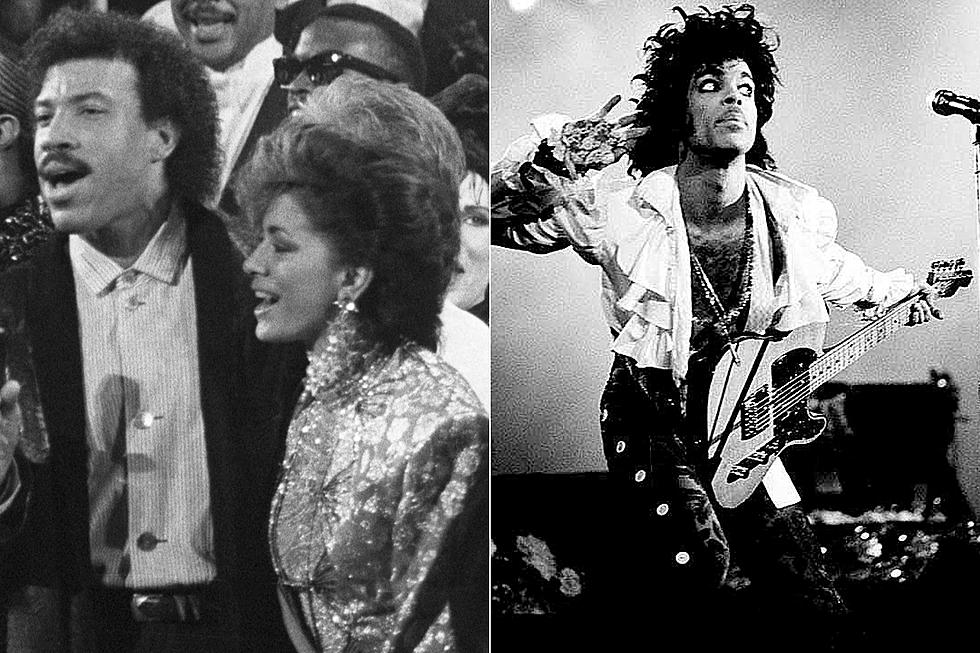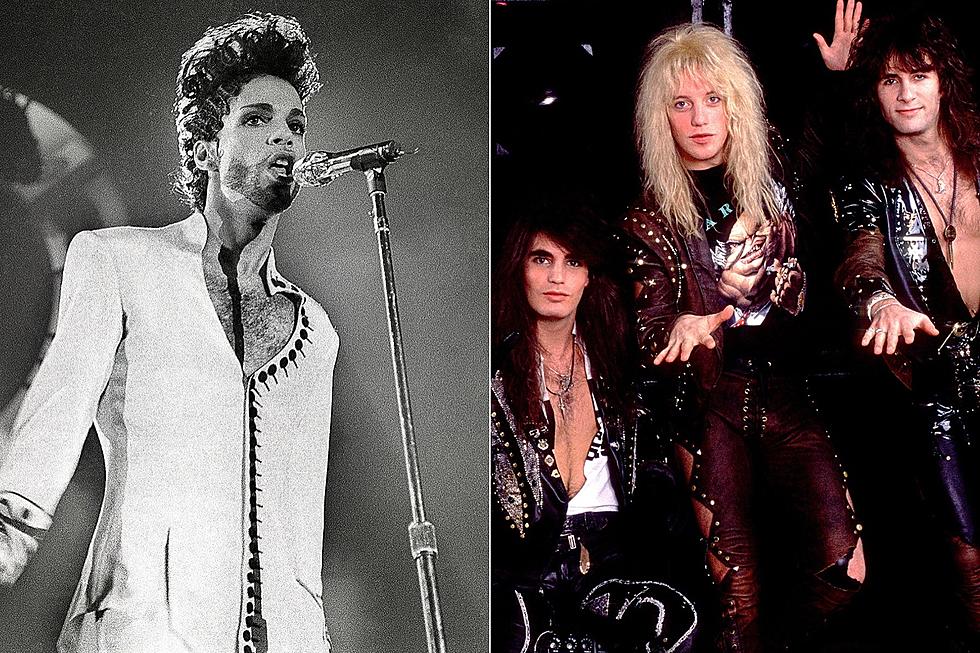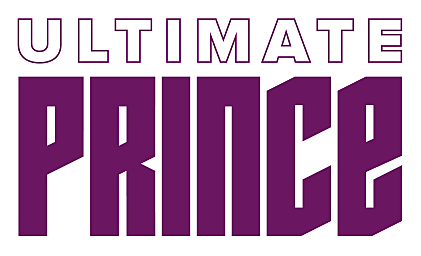
Prince Has No Time for ‘Old Friends 4 Sale’
While purple rain is the defining metaphor in Prince’s canon, a half-inch of white snow set one of the most heartbreaking chapters in his career into motion: the breakup of the Time. While a reworked version of “Old Friends 4 Sale” was eventually released in 1999 as the title of Prince’s de-facto 22nd album, the contract filler The Vault: Old Friends 4 Sale, the original tells a chilling tale of love and betrayal between a band of brothers.
Most Prince fans first heard of “Old Friends 4 Sale” when he popped a cassette of it into the tape deck of his white Thunderbird while driving writer Neal Karlen around his childhood haunts for the 1985 Rolling Stone cover story, "Prince Talks." Karlen called the song, “an arrow-to-the-heart rock ballad about trust and loss.”
According to PrinceVault, initial tracking of the song took place on April 20, 1985 at Sunset Sound in Los Angeles. Two days later, Around the World in a Day would hit record store shelves and dramatically alter the creative trajectory of Prince’s career. The song was included in an early track list for the Parade album, but it was subsequently dropped. In the book, Prince: The Man and His Music, author Matt Thorne writes, “’Old Friends 4 Sale’, which features Prince responding in an unusually direct way to events in his life… appears to be so autobiographical that it could never have soundtracked a film in which Prince was playing a fictional character.”
“The sun set in my heart this afternoon,” Prince sings in the original version, “4 2 friends of mine got stuck in the snow.” The two friends in question were Jimmy Jam and Terry Lewis, respectively the Time's keyboardist and bassist. In the book, Prince and the Purple Rain Era Studio Sessions 1983 and 1984, author Duane Tudahl recounts the fateful day of March 24, 1983. The Time was due on stage in San Antonio that evening to open for Prince. Jam and Lewis were in Atlanta, producing sessions for the SOS Band.
“We get to the airport, and it starts snowing”, said Jam in an interview recalling the half-inch that shut down the airport. They missed the gig and were later fired from the band. But unlike the dozens of talented musicians that would come and go from Prince’s orbit in the years ahead, Jam and Lewis were different – they were like family.
Jam was born James Harris III, son of Cornbread Harris, a locally renowned singer and piano player. He started playing piano professionally at the age of 12, around the time of a fateful encounter at Bryant Junior High. “When we met in junior high,” Jam told Billboard in the days after Prince’s death in 2016, “Prince had the biggest afro in the world. I was envious of his hair, 'cause my mom would never let me wear it like that. I was a good keyboard player, but he was on a whole ‘nother level -- and we’re talking 12, 13 years old. He was kind of quiet, didn’t talk a lot, but when he was around music, it opened him up. You could tell that that was his comfort zone.”
In 1981, Jam joined a local band called Flyte Time, led by Lewis. As Prince’s career soared, he had too many musical ideas to release under his own name. Inspired by the film, The Idolmaker, Prince merged two local acts, Flyte Time and the Enterprise Band of Pleasure into a new group, The Time, led by another childhood friend, Morris Day. While Prince wrote and recorded most of the music on the Time’s first three albums, the band turned into a ferocious live unit. Soon, the Time became a Funkenstein-type monster that would often upstage Prince and his band, the Revolution. Their rivalry was documented in Purple Rain. According to Jam, Prince once called the Time “the only band I’ve ever been afraid of.”
The Time truly was a monster of Prince’s own creation. He pushed them to the limit, all while working on his own iconic records. "I remember when we were first rehearsing for the second tour," Jam told Billboard. "Prince would walk over to the keyboard: 'Okay, you can never have a lazy hand. You've got to be fillin' in stuff. Jimmy, what are you doing? You got to do this.' I said, 'That ain't even on the record.' He said, 'You do better than on the record.'"
In the book, Prince Life & Times, author Jason Draper describes one of many times the rivalry hit the wrong notes, “The bad blood between the two groups boiled over during the final Controversy show in Cincinnati, when during the Time’s set Prince and some of his cronies egged their support staff from off stage.” Incidents like these set the stage for defection. “Frustrated by the lack of creative freedom afforded them, Jimmy Jam and Terry Lewis had begin to produce other groups without telling their boss.”
When the pair finally got out of Atlanta and rejoined the tour, Prince’s managers laid down the law. “They fined us $2,000, but we were only making $170 a week, so I don’t know where they thought they were going to get that money from,” said Jam.
At the end of the tour, Jam and Lewis were fired. Where it happened, nobody disputes. How it happened remains a mystery, except to those who were in Studio 2 of Sunset Sound on April 18, 1983. Prince, Day, Jam and Lewis were joined by guitarist Jesse Johnson who described the studio as so small, “you could stretch your arms out in it and almost touch both sides of it.”
According to Prince, in a 1990 follow-up Rolling Stone interview with Karlen, he wasn’t the one who fired the duo. "I'm playing the bad guy," says Prince, "but I didn't fire Jimmy and Terry. Morris asked me what I would do in his situation. You got to remember, it was his band."
“He absolutely fired them,” Day recalled in Tudahl’s book. “We were part of his production company. He was calling the shots.” In the book, Johnson backs up Day’s story, “We just sat there and listened to Prince. The Time was Prince’s thing. All those groups were Prince’s groups.” “It devastated me,” Lewis told Rolling Stone in 1987. “These are the guys I grew up with. It was like taking your family and splitting it in half.”
In “Old Friends 4 Sale”, Prince sings, “I know, no matter how pleasant your past was / Green and white return 2 blue”, perhaps an early intonation the sentiment, “Mo’ money, mo’ problems”. “Prince had told us, “Don’t go produce other bands.” He didn't want us to give away the Time's sound,” said Jam in Billboard. ”And we felt like, well, the records we're doing have nothing to do with the Time sound.”
After the tense meeting, when only Prince and Johnson remained in Studio 2, Prince said, “You’ll never hear from those guys again.” That evening, Jam and Lewis continued work on the SOS Band tracks that would be the first in a long line of hits for the production pair. Their fates forever changed a few years later when they were introduced to another artist who was looking to make a name for herself beyond the confines of her famous family: Janet Jackson.
After an introduction by John McClain of A&M Records, Jackson flew to Minneapolis. Instead of hitting the studio, the trio hit the town, “We went to the movies, hung out at the lake, went to some clubs,” Jam told Rolling Stone, “We would have conversations about different things.” One of the themes that emerged was her desire to have more control in her life and career, and that worked its way into the songs.
Control, the album, debuted on the Billboard 200 at a modest No. 102, but hit after hit followed and it went on to sell more than 10 million copies worldwide. “With production that sounded unlike anything else in 1986 working in perfect harmony with Jackson’s beautiful voice, the album helped launch her into superstar status,” said music critic Gino Sorcinelli writing for Medium.
Jam and Lewis went on to land 16 singles at the top of the Billboard Hot 100; in addition to eight for Ms. Jackson, their No. 1 hits include “Human” by Human League and “Monkey” by George Michael. They’ve worked with everyone from original Flyte Time singer Alexander O’Neal to Pia Zadora with longtime Prince rival Michael Jackson in between. Along the way, they’ve won five Grammy awards.
As the years went on, the ice between Prince and the superstar producers began to melt. “Listen, Prince was very competitive but he was also very proud of what Terry [Lewis] and I had done as producers,” Jam told Ebony after Prince’s death. “Prince fired us (once) and how do I feel about it? Obviously it was a life-changing experience, but it was certainly for the better. Our wings were the knowledge we learned from him. It was very pivotal, our working with him.”
Jam and Lewis eventually rejoined the Time, just in time to appear in Prince’s Graffiti Bridge film and contribute to their 4th album, Pandemonium. That album featured full band input for the first time and included their biggest-selling single to date, “Jerk Out.” They reunited again under a new name, the Original 7ven, for 2011’s Condensate. “We decided to go the route of 'let’s not hold things up because of the name,” Jam told the Electronic Urban Report. ”Let’s embrace the opportunity to move forward in a new era, with a new outlook, with a new album' and that’s what we did. We think the name reflects exactly who we are. We are the Original 7even and that basically, for me, covers it.”
As for reuniting one more time with Prince, well, that was being discussed prior to 2016. “Terry Lewis and I were talking about our bucket list of people we want to produce, and Prince's name was at the top of it,” said Jam. “Terry mentioned it to Prince. At first he just laughed. Then he said, ‘What would you do?’ Terry said, ‘The first thing we’d do is go to the vault. Let’s finish those songs, and go from there.’ Just as an example, the versions of 'Jungle Love' and 'The Bird' that were in Purple Rain were live recordings at First Avenue. But there are studio recordings of both songs. And they are impressive. He was sitting on a lot of treasures. He used to say, ‘I’m keeping these for myself.’"
Prince kept ‘Old Friends 4 Sale’ to himself before stripping out the autobiographical messages and making it a more generalized tale of romantic betrayal. In the officially released version, complete with orchestration by Clare Fischer, Prince sings “I guess what my own brother told me was true / He had been with my sweet baby and she never really loved me at all.” Of the album of the same name, given to Warners alongside Chaos and Disorder to fulfill Prince’s contract, Thorne writes, “If it is not as obviously a record created in anger, it was at least delivered with resentment. On the back cover Prince appears to be looking down in despair.”
Just as the fences mended between Prince and the Time, Prince returned to Warner Bros. in 2014 for two new albums and a deal that resulted in 2017’s expanded reissue of Purple Rain. Jam hopes that much more of Prince’s vault music will eventually see the light of day, “It's too early to speculate -- a lot of things need to be settled with his estate, and maybe he had plans for his recordings. At the appropriate time, Terry and I would be interested in being part of the curation process.”
More From Ultimate Prince










